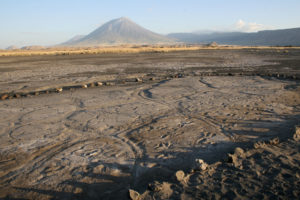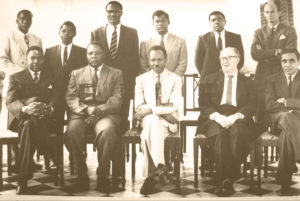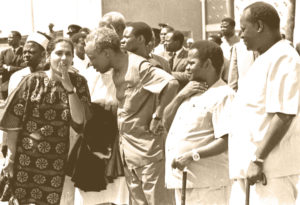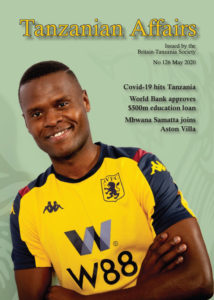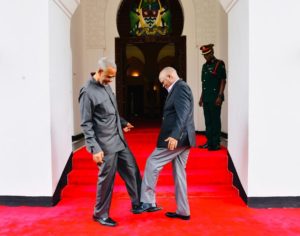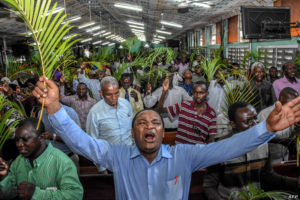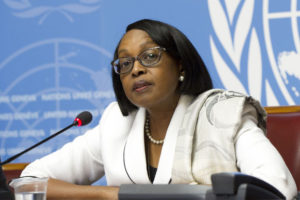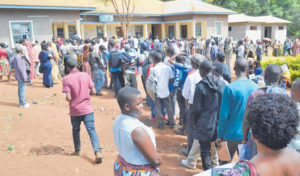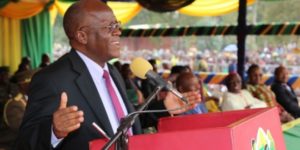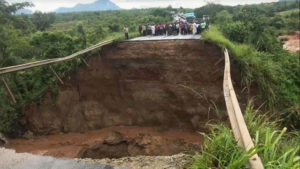Edited by Donovan McGrath
Jane Goodall in isolation
(New York Times – USA) The researcher talks about animals and about being alone. Extract continues: Jane Goodall is in isolation these days, along with many other people, since a fund-raising tour was cancelled because of the coronavirus pandemic. She is staying at her family home in England, not in Tanzania, her primary home when not on the road. Dr Goodall changed the way the world views chimpanzees with research that began when she first went to Africa 60 years ago … a young woman without a college degree, to observe chimpanzees in the wild at what is now the Gombe Stream Research Centre in Tanzania. She later became the tireless advocate for chimps in captivity… Today, the Jane Goodall Institute supports the continuation of the research she started at the Gombe Stream Research Centre as well as programs in community involvement in conservation, and education… I [the writer James Gorman] called Dr Goodall … and spoke to her for about a half-hour about humans, animals, the coronavirus pandemic and what gives her hope… Well, I [Jane Goodall] started off being unbelievably frustrated that I was grounded. And I then thought, well, OK, that’s, that’s not helpful. So I began thinking of all the different ways that I could stay out in the public without being there, so to speak… Being isolated has made me think of what it must be like for chimpanzees who were isolated in captivity, who depend on physical closeness and touch… We are not separated from the rest of the animal kingdom, we’re part of it… (1 April 2020) – Thanks to Elsbeth Court for this item – Editor
On the road with East African truck drivers
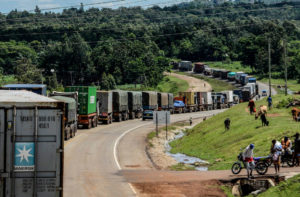 (Mail & Guardian online – South Africa) Extract: Khamis Makaranga did not intend to cause a diplomatic incident. He just wanted to deliver the tomatoes in the back of his truck. Makaranga plies the highway between Dar es Salaam and Nairobi. Those tomatoes from Tanzania’s central Iringa region, were destined for a market in Kenya’s capital city. They never arrived. When he got to the Namanga border post, Makaranga saw hundreds of trucks waiting to cross into Kenya… Every truck driver entering the country is being tested by Kenyan authorities, adding days to their journeys. Makaranga was tested … [H]is result came back: he was positive. “I didn’t agree with the medical result from the Kenyans,” Truck drivers wait to be tested for COVID-19 on the Uganda/Kenya border in Malaba (Brian Ongoro / AFP) he tells the Mail & Guardian, as he didn’t show any symptoms. In total, 19 Tanzanian truck drivers tested positive, and Kenya would not allow them in. Makaranga and other drivers complained to the Arusha regional commissioner, Mrisho Gambo, who gave an explosive press conference on May 20. Gambo said a Tanzanian laboratory had tested the drivers, and all came back negative. He accused Kenya of deliberately falsifying the results in order to sabotage Tanzania’s tourist industry. Within hours, a furious Kenya had shut its land border, with Tanzania threatening to follow suit. It took personal interventions from President Uhuru Kenyatta and President John Magufuli to defuse the tensions – but not before Makaranga’s tomatoes had turned rotten in the back of his truck… (1 June 2020)
(Mail & Guardian online – South Africa) Extract: Khamis Makaranga did not intend to cause a diplomatic incident. He just wanted to deliver the tomatoes in the back of his truck. Makaranga plies the highway between Dar es Salaam and Nairobi. Those tomatoes from Tanzania’s central Iringa region, were destined for a market in Kenya’s capital city. They never arrived. When he got to the Namanga border post, Makaranga saw hundreds of trucks waiting to cross into Kenya… Every truck driver entering the country is being tested by Kenyan authorities, adding days to their journeys. Makaranga was tested … [H]is result came back: he was positive. “I didn’t agree with the medical result from the Kenyans,” Truck drivers wait to be tested for COVID-19 on the Uganda/Kenya border in Malaba (Brian Ongoro / AFP) he tells the Mail & Guardian, as he didn’t show any symptoms. In total, 19 Tanzanian truck drivers tested positive, and Kenya would not allow them in. Makaranga and other drivers complained to the Arusha regional commissioner, Mrisho Gambo, who gave an explosive press conference on May 20. Gambo said a Tanzanian laboratory had tested the drivers, and all came back negative. He accused Kenya of deliberately falsifying the results in order to sabotage Tanzania’s tourist industry. Within hours, a furious Kenya had shut its land border, with Tanzania threatening to follow suit. It took personal interventions from President Uhuru Kenyatta and President John Magufuli to defuse the tensions – but not before Makaranga’s tomatoes had turned rotten in the back of his truck… (1 June 2020)
The smouldering pandemic Why covid-19 seems to spread more slowly in Africa
(Economist online – UK) Extract: ... John Magufuli, Tanzania’s president, does not believe his country’s results. “We only see them releasing positive, positive, positive results,” he said. He claims that the national laboratory was sent papaya, goat and sheep samples that tested positive. (The lab denies this.) No new official data has been released since April 29th. Opposition activists and NGOs say that there have been dozens of burials of covid-19 victims in Dar es Salaam … On May 12th the American embassy said that hospitals there were “overwhelmed”. “It is a cover-up”, says Zitto Kabwe, an opposition leader… (16 May 2020) – Thanks to John Rollinson for this item – Editor
Tanzanian leader accused of suppressing death statistics
(Financial Times online – UK) President blames ‘imperialists’ for the large number of positive results in tests. Extract continues: Tanzania’s government is covering up the true extent of the coronavirus pandemic with secret burials at night while hospitals overflow and three parliamentarians are thought to have died from the disease, say doctors, opposition leaders and activists. President John Magufuli, who has spent much of the crisis in his home village 750 miles west of Dar es Salaam … denies the virus is serious and has urged people to stay at work and attend religious ceremonies… [I]n a national address, Mr Magufuli accused the national laboratory of fabricating results under the influence of what he called imperialists… Zitto Kabwe, an opposition leader, said the allegation could cause people to lose faith in the health system’s response to Covid-19… Although schools have been closed since mid-March, social distancing has not been enforced strictly, making the nation of 56m people unusual in Africa where many countries have imposed lockdowns, curfews and other controls… The government said it had implemented more than 40 measures to curb the pandemic and was learning from other countries. It defended its statistics and denied it was hiding the extent of the outbreak, adding: “it takes one to be insane to insinuate that Tanzania is not taking serious measures or hiding data.” A person close to the medical profession said it was almost impossible to secure a hospital bed in several cities… (5 May 2020) – Thanks to Jerry Jones for this item – Editor
Tanzania’s digital doctor learns to speak Swahili
(Financial Times online – UK) Extract: With one doctor per 25,000 people, the Swahili speaking east African country of Tanzania struggles to serve the needs of its 59m people. Life expectancy is 62 for men and 66 for women, while just two-thirds of the population live within 5km of a health facility. “Traditional models will not fix this problem,” says Hila Azadzoy, managing director of the Global Health Initiative unit at Ada Health, a Berlin-based artificial intelligence-powered medical company. “Technology can empower users to take decisions about their own health by putting the power of AI into their hands,” she adds. Available since 2016, Ada Health’s chatbot symptom checker app has attracted 9m users worldwide, including 3m in low- and middle-income countries. The free-to-download app invites users to input symptoms and pre-existing medical conditions before using AI-based questioning to pinpoint possible diagnoses – it then recommends next steps such as resting or seeking professional help. The digital doctor now speaks Swahili – the lingua franca of 100m people in east Africa
– thanks to Ada’s Global Health Initiative… Replacing doctors is not Ada’s intention – instead it says it wants to facilitate interaction between users and healthcare experts while deterring unnecessary clinic visits by providing health information via smartphones… (16 May 2020)
‘Many girls have been cut’: how global school closures left children at risk
(Guardian online – UK) Extract: Covid-19 closures have exposed children around the world to human rights abuses such as forced genital mutilation, early marriage and sexual violence, child protection experts say. Globally, the World Bank estimates that 1.6 billion children were locked out of education by Covid-19… NGOs warn that millions of the world’s most vulnerable children may never return to the classroom, and say that after decades fighting for girls’ education the pandemic could cause gender equality in education to be set back decades. In Tanzania, girls sent home from boarding schools where they were being protected from FGM have already been cut… The Dutch charity Terre des Hommes runs a safe house for girls in Tanzania, protecting them from FGM. “The community has taken advantage of this situation of Covid-19 and where children are now back at home they are cutting their girls. They know it is against the law but they are not afraid. We had one mother who was jailed for a year after carrying out FGM but for her she is happy. She is locked up but her girl is cut… (1 June 2020)
Simba regains his pride: Tortured lion cub subjected to horrific abuse while used to lure tourists in Russia will be flown for a new life in Africa
(Daily Mail online – UK) Extract: A lion cub called Simba subjected to horrific cruelty in Russia is to be flown to Africa to start a new life. The tortured animal’s legs were deliberately broken to stop it running away while being exploited on beaches as a photo prop for tourists. Holidaymakers paid to have their pictures taken with the cute little lion… The crippled cub could hardly move and was on the point of death when it was rescued. Vladimir Putin was so shocked that he personally ordered a criminal probe into the cruelty faced by Simba. Groundbreaking surgery means the cub can now walk and play … but Simba will remain deformed for life. Now though, Russians behind the beast’s rescue have arranged for the cub to fly 6,500 miles from the Ural Mountains to a big cats rehabilitation centre in Tanzania. The animal surgeon who saved Simba’s life, Karen Dallakyan, from Chelyabinsk, said: ‘The return to their spiritual homeland of wild animals of Africa rescued in Russia is taking place for the first time in our country’s history.’ … He said: ‘Evil photographers break bones like this so that wild predators cannot escape and behave calmly for pictures (with tourists).’ Yulia Agaeva, who headed the operation to save Simba, said there had been 30 offers to take and care for the lion, but she was convinced Tanzania was the right place… The Tanzanian embassy is assisting with the operation to take the big cats to Africa … (8 August 2020)
Women were left to find dinner 19,000 years ago! Fossilised footprints in Tanzania show labour was divided between the sexes in ancient human communities
(Daily Mail online – UK) Extract: Ancient footprints in Tanzania suggest that women were responsible for foraging for food and did so together in groups as early as 19,000 years ago. The find is the largest collection of footprints from the human fossil record ever found in Africa, according to the team from Chatham University. Researchers discovered 408 human footprints at Engare Sero in Tanzania after the site was found by a member of the nearby Maasai community. One group of 17 footprints were made by 14 women, two adult men and a younger boy, according to the team, who say the women were foraging for food. ‘The findings may indicate a division of labour based on sex in ancient human communities,’ said Dr Kevin Hatala, study lead author. The researchers couldn’t say what the men and boy were doing but suspect they were either providing protection or just ‘walking along with the women for a bit’. The team dated the footprints between 19,100 and 5,760 years old – this would put them during the Pleistocene period… Dr Hatala said the behaviour demonstrated by the women and men is similar to the way modern hunter-gatherer tribes such as the Ache and Hadza operate today… (15 May 2020)
The world’s first Freddie Mercury museum is on an African island
(CNN online – USA) Extract: … Down a small, narrow alley in the historic Stone Town neighbourhood of Zanzibar, an old building beckons to visitors. Faded photographs are pinned outside the door while inside, a gallery of glossy pictures and old newspaper clippings lead the way to the room’s centrepiece: a black piano with an interesting history. A young Zanzibari boy once played that piano. His name was Farrokh Bulsara, but you probably know him better as Freddie Mercury. The flamboyant frontman of British rock band Queen, Mercury was born in Zanzibar, a semi-autonomous island off the coast of Tanzania. This museum is dedicated to his memory… Zanzibari businessman Javed Jafferji is co-owner of the Freddie Mercury Museum. Jafferji was a college student in London in the mid-1980s when he first became a fan. “At the time, not many people knew (Mercury) was from Zanzibar,” he says. Even today, many people don’t know about Mercury’s Zanzibari roots, says Jafferji. His goal is to put Stone Town on the rock history map… Mercury spent most of his childhood in Zanzibar and attended boarding school in India. In the early 1960s, his family moved to the UK. Less than a decade later, Mercury formed Queen – and went on to attain rock legend status. He never returned to his birthplace… “We really want to create awareness of Freddie Mercury in Zanzibar and in Tanzania overall,” says Anam Adnan, general manager of the museum. “We want people to celebrate him and love him.” But celebrating Freddie Mercury in Zanzibar is complicated. Had Mercury returned there later in life, he would have likely struggled to gain acceptance in a predominantly Muslim community where homosexuality is illegal. “We haven’t put much attention to this personal life because that’s a controversial topic for Zanzibaris,” says Adnan. Instead, she says, the museum focuses on Mercury’s music and his art. “It’s the biggest tribute that we, as Zanzibaris, can do for him.” (10 June 2020)
Burundi refugees in Tanzania face new pressure to go home
(Washington Post online – USA) Extract: Burundian refugees in Tanzania say they fear being forced to return to their country now that a new president has taken power and invited them home. Hundreds of thousands of Burundians fled during the bloody political turmoil that followed former President Pierre Nkurunziza’s decision to seek a third term in 2015. Nkurunziza decided not to run again in May’s elections and died days later in what the government called a heart attack. New President Evariste Ndayishimiye is now being watched closely for any breaks with his predecessor, whose rule slid into repression in its final years… He invited all those in exile to return and build a new nation… Tanzania’s director of the department of refugees visited camps for Burundians in western Tanzania where close to 200,000 remain, refugees told The Associated Press. “He carried one message: Go back to your country, there is peace now,” refugees said… A coalition of refugees’ human rights defenders denounced the Tanzanian official’s position… Leopold Sharangabo, the coalition’s vice president… noted the new appointment in Burundi of a prime minister, Alain Guillaume Bunyoni, who is under U.S. sanctions for his alleged role in rights abuses. He called the appointment an insult to refugees. “These people harassed us, killed us, tortured us and forced us into exile. How can we be asked to go back under their regime?” he asked… (7 July 2020)

